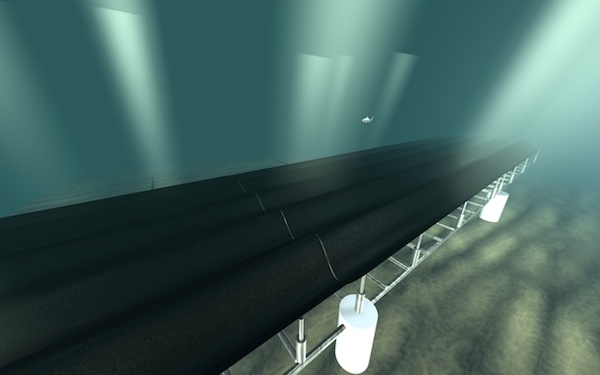
A team of researchers at UC Berkeley is developing a hydraulic seafloor ‘carpet’ that could be used to harvest the energy of ocean waves and convert it to usable clean energy. Since waves are constant, as opposed to sun and wind, this could prove a viable source of carbon-free energy for coastal regions. Wave energy is considered a huge potential source of renewable energy, but the systems for harnessing it are still very underdeveloped. Since there has been a rise in population in coastal cities this form of energy harvesting could prove a great, and, more importantly, clean source of renewable energy.
The wave-to-energy seafloor ‘carpet’ is made from a thin sheet of rubber, which is placed atop a system of hydraulic actuators. The latter are pumped via the motion of the carpet as the waves move it. This results in hydraulic pressure, which is led to the shore through pipes, and is then converted to usable energy. This method of harvesting the power of waves has minimal physical and visual impact on the ocean, sea life and boat traffic.
The team of researchers is led by Reza Alam, an assistant professor at UC Berkeley and an expert in wave mechanics, who says he got the idea for the carpet from observing the mechanics of muddy seabeds, which function to convert the energy from surface waves to heat. The carpet system for harvesting energy could also be used in areas that are not usually suitable for fishing or other forms of recreation. The researchers are currently looking for a suitable spot in which to place the system in, which should be about 60 feet deep.
So far they’ve tested the carpet system in a wave tank, and proved that it was capable of absorbing more than 90% of the incoming wave energy. They also found that the system can operate in stormy conditions and is even more efficient at times when the waves are stronger. The researchers are currently raising funds to further develop the seafloor carpet through a crowdfunding campaign on Experiment.com. They’re looking to raise $10,000, which will allow them to fully proof the functionality of a pilot system in the ocean that they are planning to launch at the Northwest National Marine Renewable Energy Center in Newport, Oregon in 2016.
Related Articles on JetsonGreen.com:
Plastic Bags Can be Recycled Into Diesel Fuel
Energy Efficient T8 LED Lamps by Cree
Solar Cells Might Soon be Made of Paper

Leave a Reply
You must be logged in to post a comment.